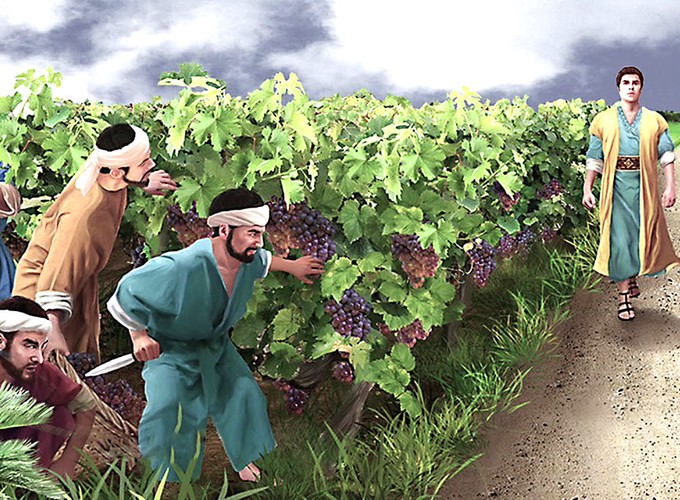
St. Rabanus, a Father of the Church from the 8th century, has an interesting take on today’s parable, “a vineyard has been let out to each of us to dress, when the mystery of baptism was given us, to be cultivated by action. Servants one, two, and three are sent us when Law, Psalm, and Prophecy are read, after whose instructions we are to work well. He that is sent is beaten and cast out when the word is despised or, which is worse, is blasphemed. He kills (as far as in him lies) the heir, who tramples underfoot the Son and despises the Spirit of grace. The wicked husbandman is destroyed, and the vineyard is given to another when the gift of grace which the proud has despised is given to the lowly.”
The precious vineyard we are entrusted with is our soul, divine filiation. Being children of God is a great gift we have. We have been called to eternal life, to a relationship with God.
The servants that are sent to us are all of the help we have from God to aid our spiritual life in flourishing. These aids are innumerable. We have the Word of God in Scripture, the Angels to protect us, prayer to comfort us, sacramentals like holy water, blessed medals, and scapulars; good friends, priests, and so on.
The Son is Christ with his Redemption and the Holy Spirit that came upon us. Here, we can think of the seven Sacraments, especially the real presence of Jesus in the Eucharist. It is also the presence of grace in the soul: Faith, Hope, Charity, and the Gifts of the Holy Spirit.
The thread that runs through the tenants’ response to the servants and the Son is one of ingratitude. Today’s message warns us not to reject God’s love and mercy.
If the thread on the part of the tenants is ingratitude, it is patience and mercy on the part of God. The landowner keeps sending servants and finally sends his Son. One of the Fathers points out that “at each step of their wickedness the mercy of God was increased, and at each step of the Divine mercy the wickedness of the Jews increased; thus there was a strife between human wickedness and Divine goodness.”
In other words, God redoubles his mercy as our wickedness increases. But, of course, God does not oblige us to answer to his love. We still have freedom. The last part of the parable illustrates the consequences of abusing that freedom.
Let’s, therefore, apply this message to our lives.
First, let’s be grateful to the Lord for his love and mercy. Just as the landowner kept sending his servants and, lastly, his Son, the Lord is always reaching out to us. He is constantly working in our lives. He calls us to his friendship, to be his sons and daughters.
Second, we are called to give fruit, to develop the life of grace in the soul. We do so through prayer, the frequent reception of the Sacraments, and service to our brothers and sisters.
Third, we must be faithful to God’s Revelation in Scripture and Tradition. We should read and reflect frequently on the Bible, study the Catechism, and even join a bible study or a book club to help us deepen our faith.
Fourth, let us be obedient to the Commandments and strive to practice the evangelical perfection of the Beatitudes.
If we do these things, we will be good tenants, rewarded with the friendship of God here below and in eternity.

